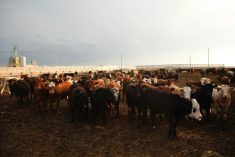Some Manitoba Crown lands not generally used for grazing or haying will be made available for temporary lease to producers this summer and fall.
Citing “dry conditions in parts of the province,” the Manitoba government announced Monday that livestock producers “will temporarily be allowed to cut hay and allow animals to graze on Crown land not normally designated for agricultural use.”
Crown land can be made available for agricultural use “under certain circumstances,” the province said, by way of its Agricultural Crown Lands Leasing program, which will administer the use of available land and provide necessary permits.
Read Also

Trump tariff on Brazilian goods could jack up U.S. burger price
U.S. President Donald Trump’s plan for a 50 per cent tariff on goods from Brazil will likely raise prices for the beef that is used in American hamburgers, traders and analysts said on Thursday, as food manufacturers increasingly rely on imports during a time of declining domestic production.
Producers interested in such leases are asked to contact the program office in Minnedosa or their local Crown lands representative.
Eligible producers’ livestock must be removed from the land either “when the naturally existing forage is exhausted” or by Oct. 31, the province said, and any baled hay must be removed by Nov. 15.
“The dry conditions of the past couple of years have created challenging conditions for beef producers in terms of the amount of grazing days available on their pastures and the volume and quality of hay they have been able to harvest,” Manitoba Beef Producers president Tom Teichroeb said Monday in a separate release.
“This announcement will provide an important option for producers who require additional feed options and we thank the government for making this available.”
Producers with AgriInsurance contracts who plan to put a crop to “alternate use” must contact the Manitoba Agricultural Services Corp. office to arrange for a field appraisal prior to harvesting the crop, the province noted Monday.
Crop producers “should also consider making crop residue available to livestock producers,” the province added.
“I know there are many beef producers who would welcome those kinds of conversations,” MBP’s Teichroeb said.
MBP, he added, “will continue to engage with the government about the effects of the dry conditions and possible strategies to help producers deal with these situations, such as water supply challenges.” — Glacier FarmMedia Network













